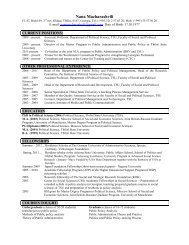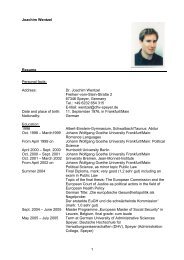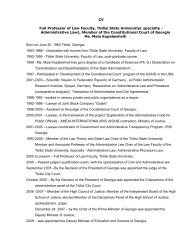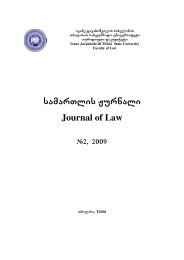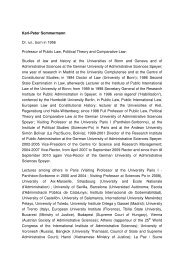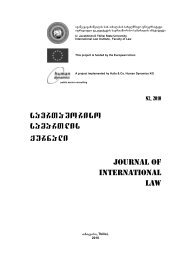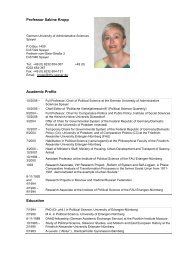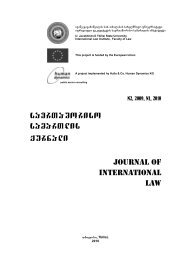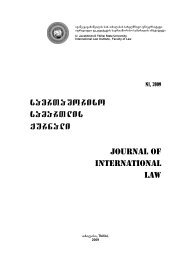Untitled
Untitled
Untitled
You also want an ePaper? Increase the reach of your titles
YUMPU automatically turns print PDFs into web optimized ePapers that Google loves.
I. KURDADZE, STAGES OF DEVELOPMENT OF SCIENTIFIC CONCEPTS ON CORRELATION BETWEEN ...<br />
correlation of domestic and international law,<br />
but at separating the international and domestic<br />
legal orders, as the legal order is the broader<br />
concept.<br />
In our opinion, the usage of the terminology<br />
related to this issue is relative, as notwithstanding<br />
whether we talk about legal system<br />
or the legal order, the objective boundaries<br />
between the domestic and international law<br />
are defined by the nature of the regulation of<br />
relations and the circle of participants of the<br />
respective relations. S. Chernichenko argues<br />
about the livelihood of the dualist theory in his<br />
monograph as well. It is interesting to observe,<br />
how carefully he introduces in his reasoning<br />
the concept of the “priority of international law”<br />
and develops the idea. He mentions that international<br />
law and domestic law function in<br />
different spaces and therefore identifying the<br />
issue that international law cannot regulate<br />
domestic relations is not grounded, the author<br />
declares that domestic law must correspond<br />
the international law in order to ensure<br />
its implementation. In this sense he considers<br />
primacy of international law as acceptable. 32<br />
The author almost confesses in the consideration<br />
that there is a legal system (international<br />
law) to which domestic law must correspond.<br />
Naturally, the question emerges, if<br />
there is no legal requirement of establishing<br />
such a correspondence, why should a state<br />
voluntarily implement such a legal action The<br />
author sees the answer in the constitutional<br />
norm, though the constitutional norm is a higher<br />
standing norm in domestic law that causes<br />
the question: why is such a norm included in<br />
the constitution<br />
The prominent Russian scholar I.<br />
Lukashuk considers that the direct functioning<br />
of international norms has a relative character,<br />
as the norms commence direct action<br />
only when they are attributed the corresponding<br />
legal force in line with the national law. 33<br />
A state decides itself, which system to<br />
choose, but a state shall create such a legal<br />
system which provides for the implementation<br />
of international obligations. According to him,<br />
when establishing the correlation of international<br />
and domestic law, the main role is attributed<br />
to the constitutional law. Lukashuk<br />
points out the Article 27 of the Vienna Convention<br />
on the Law of Treaties and declares,<br />
that even in cases when international treaty<br />
contradicts constitution, it retains the international<br />
legal force for the state. However within<br />
the state it – the treaty – is almost not applicable.<br />
In the third edition of the work the author<br />
considerably “renews” his concept. He shifts<br />
an attention towards the “correlation” of the<br />
two systems. This time the author closely relates<br />
this phenomenon with the globalization<br />
process – “the tending of the legal regulation<br />
toward globalization seems more and more noticeable<br />
… the deepening of interrelation of<br />
international and domestic laws leads us to<br />
the creation of the global legal system, or the<br />
super system”. 34 But the author underlines that<br />
this does not mean the creation of “the world<br />
state”, “the world law”. The national legal system<br />
in a large part operates as the part of the<br />
global legal system and must correspond to<br />
its principles.<br />
However this does not mean the complete<br />
dominance of international law with regard to<br />
the domestic law. The subjection of the domestic<br />
legal system occurs only when this is<br />
needed for the normal functioning of international<br />
law. 35<br />
Therefore, I. Lukashuk on the one hand<br />
rejects the supremacy (primacy) of the universally<br />
recognized principles and norms of<br />
international law (it is apt to mention that the<br />
author in principle talks about the priority of<br />
international treaties) over the norms of domestic<br />
law without the indication of state will,<br />
however at the same time he is compelled to<br />
very vaguely recognize the necessity of subjecting<br />
the domestic law to international, that<br />
he explains with the advancement of the globalization<br />
processes. Here we again confront<br />
the main issue – what compels the state to<br />
act in accordance with the universally recognized<br />
principles and norms, not only at the<br />
international plane, where the primacy of international<br />
law is universally recognized, but<br />
also within a state as well, in cases when its<br />
laws, including constitution, contradict the<br />
mentioned principles and norms. The essence<br />
of the primacy after all is that the norms of<br />
international law take precedence notwithstanding<br />
whether a state recognizes them or<br />
not, as the general will of states to cooperate<br />
stands higher than the will of one particular<br />
state.<br />
The issue of correlation of international<br />
law and domestic law has never been the subject<br />
of complex study and analysis in the Georgian<br />
27



